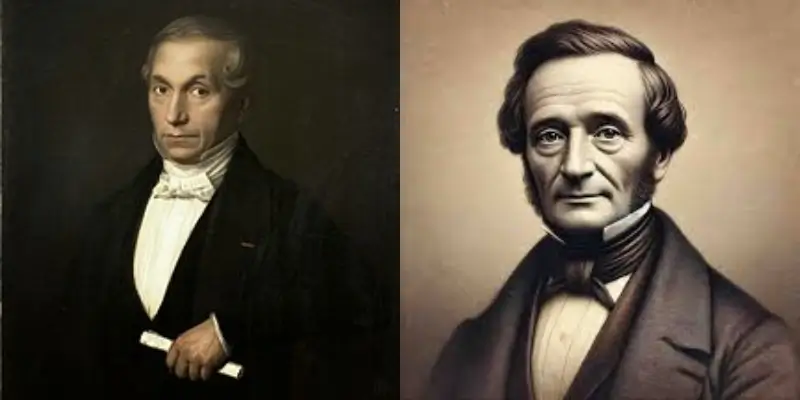Ferdinand Berthier, a significant figure in the history of deaf education, left behind a legacy of profound contributions to the understanding and teaching of the deaf community. His writings and research have played a pivotal role in shaping modern deaf education, particularly in France.
Through Ferdinand Berthier Books, he illuminated the history of deaf culture, highlighting the efforts of pioneering educators such as Abbé de l’Épée and Abbé Sicard. His works have become essential for anyone interested in the history of sign language, deaf advocacy, and the development of educational systems for the deaf.
In this article, we will delve into the life and works of Ferdinand Berthier, examining his contributions to the field of deaf education and how his books continue to influence the deaf community and modern educators alike.
We will explore his most influential works, the cultural impact of his writings, and how he documented the evolution of sign language and deaf culture. Through this comprehensive analysis, we aim to provide a clear and thorough understanding of Berthier’s legacy in shaping the educational and cultural landscape of the deaf community.
Who Was Ferdinand Berthier?
Ferdinand Berthier (1803–1886) was a French intellectual and advocate for the deaf community, best known for his role as a historian, educator, and author. He was deeply involved in promoting the education of the deaf and highlighting the cultural and historical significance of deaf individuals and their communities.
Berthier’s work was instrumental in preserving the legacy of the deaf education pioneers of his time, such as Abbé de l’Épée and Abbé Sicard. Berthier was also a prolific writer who authored several books that became fundamental texts in the field of deaf education.
His works provide not only historical insight into the lives of deaf educators but also offer a deeper understanding of the cultural impact of their contributions to the education system.
His books laid the groundwork for future research in deaf history and education, making him one of the key figures in the development of deaf culture and advocacy.

Exploring Ferdinand Berthier Books: Most Influential
One of Berthier’s most influential works is “L’Abbé de l’Épée: sa vie, son apostolat, ses travaux, sa lutte et ses succès,” which delves into the life and work of Abbé de l’Épée, a key figure in the development of deaf education.
This book highlights the challenges faced by Abbé de l’Épée and his monumental contributions to the education of the deaf. Berthier’s writing not only documents the history but also emphasizes the educational innovations introduced by Abbé de l’Épée, such as the development of sign language as a tool for communication.
Another significant work by Berthier is “L’Abbé Sicard: précis historique sur sa vie, ses travaux et ses succès,” where he explores the life and work of Abbé Sicard, who succeeded Abbé de l’Épée.
Sicard was instrumental in expanding and formalizing deaf education, and Berthier’s detailed account of his contributions helps to underscore the continuity and growth of deaf education during the 19th century.
These works are crucial in understanding the historical progression of deaf education and the intellectual figures who shaped it.
Read Also: V/H/S/85.2023
The Life and Work of Abbé de l’Épée
Abbé de l’Épée (1712–1789) was a French priest and educator who is considered one of the pioneers in the field of deaf education. He founded the first public school for the deaf in Paris, where he developed a system of sign language to teach deaf children.
His methods were revolutionary, as they provided a structured and systematic approach to educating deaf individuals, which had never been attempted before.
Berthier’s exploration of Abbé de l’Épée’s life in his book reveals not only the personal struggles and successes of this educator but also the wider impact of his work on the educational system for the deaf.
The creation of a school for the deaf was a significant turning point in the history of deaf education, and Berthier’s historical analysis of de l’Épée’s work highlights the lasting influence of his contributions on the development of deaf culture and education.
Abbé Sicard’s Role in Advancing Deaf Education
Abbé Sicard, who succeeded Abbé de l’Épée, played an equally important role in the development of deaf education. His contributions built upon the foundations laid by de l’Épée, and he introduced several innovations to improve the education of the deaf.
One of his major contributions was the development of a more advanced sign language system, which became a cornerstone of deaf education in France. Berthier’s book on Abbé Sicard emphasizes his intellectual prowess and his ability to further the cause of deaf education.
Sicard’s work was not limited to educational reforms; he also advocated for the recognition of the deaf community as a legitimate cultural group, deserving of their own language and educational rights.
His efforts laid the groundwork for the modern deaf education system, and Berthier’s writings help to preserve his legacy and ensure that his contributions are remembered.
Auguste Bébian: The Architect of Modern Sign Language
Auguste Bébian was a key figure in the development of modern sign language, and his contributions to deaf education are chronicled in Berthier’s writings. Bébian’s work focused on creating a more standardized form of sign language that could be used across different regions and communities.
His efforts were instrumental in shaping the way sign language is understood and used today. In Berthier’s book, he highlights Bébian’s role as an innovator and pioneer in the field of sign language education.
Bébian’s work was revolutionary, as it sought to establish sign language as a legitimate and effective means of communication for the deaf. His contributions were crucial in the fight for deaf rights and advocacy, and Berthier’s writings help to immortalize his role in the development of deaf culture and education.
How Ferdinand Berthier Documented Deaf History
Berthier was deeply committed to documenting the history of deaf education, and his books are among the most comprehensive accounts of the lives and works of key figures in the deaf community.
He conducted meticulous research to preserve the legacy of pioneers such as Abbé de l’Épée, Abbé Sicard, and Auguste Bébian, ensuring that their contributions would not be forgotten.
His work goes beyond just recounting historical events; it provides a critical analysis of the social and cultural implications of the deaf education system in 19th-century France.
Berthier’s writings offer a nuanced perspective on how the education of the deaf evolved, and they provide valuable insights into the struggles faced by deaf individuals and their advocates. His documentation of these struggles is an important part of the history of the deaf rights movement.
The Cultural Impact of Berthier’s Writings
Berthier’s writings had a profound impact on the cultural understanding of the deaf community. His books not only preserved the history of deaf education but also contributed to the recognition of deaf culture as a distinct and valuable part of human society.
By documenting the lives of deaf educators and advocates, Berthier helped to elevate the status of the deaf community and promote awareness of their unique needs and contributions. The cultural impact of Berthier’s work extends beyond the realm of education.
His books played a crucial role in raising awareness of the importance of deaf rights and the need for social recognition and inclusion. His efforts helped to lay the foundation for the modern deaf rights movement and continue to inspire individuals and organizations advocating for the rights of the deaf community today.
Deaf Education in 19th-Century France
The 19th century was a pivotal time for the education of the deaf in France. During this period, many significant advances were made in the development of teaching methods and the recognition of sign language as a valid form of communication.
Berthier’s books provide a detailed historical analysis of these developments, offering readers a comprehensive understanding of how deaf education evolved during this time.
The establishment of institutions like the National Institute for Deaf-Mutes in Paris played a central role in the advancement of deaf education, and Berthier’s writings capture the challenges and successes of these early institutions.
His works provide insight into the educational philosophies of the time and how they shaped the future of deaf education in France and beyond.
The Evolution of Sign Language Through Berthier’s Lens
Sign language has undergone significant changes over the centuries, and Berthier’s work provides a detailed examination of how sign language evolved during the 19th century.
His writings trace the development of sign language from its early forms, as pioneered by Abbé de l’Épée and Abbé Sicard, to the more standardized systems introduced by figures like Auguste Bébian.
By documenting these changes, Berthier helped to preserve the history of sign language and ensured that future generations would understand the importance of sign language in the education and communication of the deaf.
His work offers a unique perspective on the evolution of this vital form of communication and its role in shaping deaf culture.
Insights into ‘Histoire et statistique de l’éducation des sourds-muets’
One of Berthier’s most important works, Histoire et statistique de l’éducation des sourds-muets, offers an in-depth historical and statistical analysis of deaf education.
This book is a vital resource for anyone studying the history of deaf education, as it provides a comprehensive overview of the development of schools for the deaf, the teaching methods used, and the social and cultural context in which these developments occurred.
The Role of Intellectuals in the Deaf Rights Movement
Intellectuals have played a crucial role in the development of the Deaf Rights movement by advancing the recognition of deaf individuals as a cultural and linguistic group.
Figures like Ferdinand Berthier were pivotal in shaping the intellectual framework that challenged the societal views of deaf people as being inferior or incapable of education.
Berthier’s historical writings and advocacy for the deaf community helped shift perceptions and laid the foundation for a movement focused on equal rights and educational access for deaf individuals.
His contributions helped validate sign language as a legitimate form of communication, which became central to Deaf culture and identity. Through his works, Berthier influenced both contemporary and future generations of intellectuals and activists within the Deaf Rights movement.
Comparing Ferdinand Berthier with Contemporary Deaf Educators
Ferdinand Berthier’s impact on deaf education is undeniable, but how do his methods and views compare to those of contemporary educators? Modern deaf educators benefit from advancements in technology, more inclusive teaching strategies, and a better understanding of Deaf culture and bilingual education.
Berthier’s historical focus on the works of Abbé de l’Épée and Abbé Sicard paved the way for modern pedagogy, yet today’s educators emphasize a more holistic approach, integrating digital tools and a more inclusive curriculum for both Deaf and hearing students.
The growing recognition of American Sign Language (ASL) and other regional sign languages has also led to a more diverse educational landscape, diverging from Berthier’s era when French Sign Language was the focal point of deaf education.
Unveiling Lesser-Known Works by Ferdinand Berthier
While Berthier’s most famous works focus on the lives of figures like Abbé de l’Épée and Abbé Sicard, his lesser-known writings are just as insightful in understanding the historical context of deaf education.
Berthier’s research extended to various aspects of deaf life, including their social conditions and the evolving perceptions of their rights within society.
His lesser-known works offer valuable insights into how French society viewed deaf people in the 19th century and provide a deeper understanding of the cultural and intellectual landscape that shaped deaf education during his time.
These works are often overlooked but remain essential in appreciating Berthier’s broader contributions to the Deaf Rights movement.
The Connection Between French Deaf Advocacy and Global Movements
Ferdinand Berthier’s writings on French deaf advocacy helped shape not only local educational reform but also contributed to the broader international Deaf Rights movement. His advocacy for the recognition of French Sign Language (LSF) resonated beyond France, influencing deaf communities across Europe and the United States.
The focus on empowering the Deaf community through language recognition and educational reform laid the groundwork for similar movements worldwide.
Today, the global Deaf Rights movement is influenced by early intellectuals like Berthier, whose efforts continue to inspire activists and educators advocating for the rights of the deaf worldwide.
Sign Language Development: Lessons from Berthier’s Era
Sign language development during Berthier’s time was centered on efforts to standardize and formalize systems of communication for the deaf. Through his works, Berthier chronicled the advancements made by figures like Abbé de l’Épée, who helped shape French Sign Language.
Berthier’s documentation of these historical developments provides modern educators with a framework for understanding the origins and evolution of sign languages. His insights remind us that language is a living entity that evolves with the cultural and educational needs of the deaf community.
Today’s sign language educators can learn from Berthier’s era by focusing on both the historical significance of sign languages and the importance of preserving and adapting these languages to modern times.
The Legacy of Ferdinand Berthier in Modern Deaf Education
Ferdinand Berthier’s legacy in modern deaf education remains strong, particularly through his influence on the intellectual and cultural foundations of the Deaf community. His scholarly work continues to shape the way we understand Deaf education, language, and advocacy.
Berthier’s emphasis on documenting the lives of important historical figures in deaf education has ensured that future generations of educators, researchers, and activists have access to the information needed to carry forward the movement.
Modern educators can trace many of the principles of inclusive education, advocacy, and sign language recognition to Berthier’s pioneering efforts in the 19th century.

Forging Deaf Identity: Berthier’s Influence on Culture and Language
Ferdinand Berthier’s work played a significant role in forging the modern Deaf identity. By highlighting the contributions of key figures in deaf education and advocating for the recognition of sign language, Berthier helped create a foundation for Deaf culture to flourish.
He emphasized that deaf individuals should not be seen as inferior but as part of a thriving, rich cultural group. Berthier’s efforts were crucial in challenging the dominant societal perceptions of the time and helped build a sense of pride and empowerment within the Deaf community.
His writings continue to inspire efforts to affirm the uniqueness of Deaf culture and language.
Understanding Berthier’s Perspective on Deaf Community Empowerment
Berthier’s writings suggest a profound commitment to empowering the Deaf community. By focusing on historical figures who advanced the education of the deaf, he aimed to highlight the intellectual capacity and cultural richness of deaf individuals.
Berthier recognized the importance of providing deaf individuals with the tools necessary for education and societal participation. His perspective on empowerment centered on education, language, and cultural recognition.
Today, his advocacy resonates with modern Deaf Rights movements that continue to push for equitable access to education, employment, and cultural expression for the Deaf community.
What Modern Educators Can Learn from Berthier’s Contributions
Modern educators can glean many lessons from Berthier’s work, particularly in the areas of language, pedagogy, and cultural sensitivity. First and foremost, Berthier’s work underscores the importance of recognizing sign language as a legitimate and valuable mode of communication.
His writings highlight the need for specialized educational systems that cater to the unique needs of the Deaf community. Modern educators should also take inspiration from Berthier’s thorough historical documentation and the importance of preserving Deaf culture and language for future generations.
Berthier’s legacy reminds educators of the importance of inclusivity, respect for diversity, and the role of intellectual inquiry in advocating for marginalized communities.
The Historical Context of Ferdinand Berthier’s Advocacy
Ferdinand Berthier’s advocacy for the Deaf community must be understood in the context of 19th-century French society, which often viewed deaf individuals as social outcasts or as incapable of contributing to intellectual and cultural life.
Berthier’s writings offered a new lens through which the Deaf community was viewed, shifting the focus from pity and marginalization to empowerment and recognition.
His advocacy occurred at a time when the field of deaf education was undergoing significant transformation, with the establishment of institutions for the deaf and the development of sign languages.
Berthier’s work was crucial in positioning the Deaf community as an intellectual, cultural, and social group deserving of recognition and rights.
Read Also: UGA eLearning Commons (ugaelc)
Final Thoughts
Ferdinand Berthier’s contributions to the field of deaf education and his advocacy for the Deaf community continue to resonate today. His writings offer valuable insights into the development of deaf education, the evolution of sign language, and the ongoing struggle for Deaf rights.
Berthier’s work remains foundational in understanding the history of the Deaf community, and his advocacy continues to inspire modern educators, activists, and scholars.
By preserving and building upon his legacy, we can ensure that the struggles and triumphs of the Deaf community are remembered and that progress toward equality and empowerment continues.
FAQs
Who was Ferdinand Berthier, and what was his contribution to Deaf education?
Ferdinand Berthier was a French intellectual who played a critical role in preserving the history of deaf education and advocating for the rights of the Deaf community. His writings focused on key figures in deaf education and the development of sign languages.
How did Berthier’s work impact the Deaf Rights movement?
Berthier’s work helped to validate sign language as a legitimate form of communication and contributed to the shift in societal perceptions of the Deaf community. His writings laid the intellectual foundation for the Deaf Rights movement.
What are some lesser-known works by Ferdinand Berthier?
Berthier wrote extensively on the lives and contributions of figures like Abbé de l’Épée and Abbé Sicard, as well as on the social conditions and rights of the Deaf community. Some of his lesser-known works include historical analyses of the development of deaf education and French Sign Language.
What can modern educators learn from Berthier’s contributions?
Modern educators can learn from Berthier’s emphasis on recognizing sign language as a valid mode of communication and his focus on inclusive, culturally sensitive education for the Deaf. His documentation of Deaf history can serve as a valuable tool for contemporary teaching and advocacy.
How did Berthier contribute to the formation of Deaf identity?
Berthier’s advocacy for the recognition of sign language and the historical documentation of Deaf educators helped to create a sense of pride and cultural identity within the Deaf community, fostering a movement toward empowerment and cultural validation.




